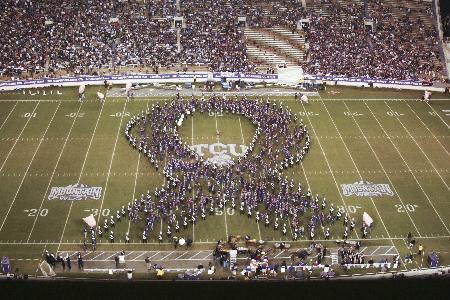A Facebook event urging students to wear all-black to the Nov. 14 football game against the University of Utah – TCU’s Pink Out game in support of breast cancer research – has generated debate on campus about what is the appropriate way to show school spirit.
Logan Luzzo, a freshman pre-business major, said he and a few friends decided to create the event in response to recent criticism concerning poor student attendance at home football games. As part of the “blackout,” attendees would wear black shirts or pants as a sign of unity and intimidation in the spirit of competition.
“It definitely was not supposed to be some big division,” Luzzo said. “(We) thought it would be a good way to hype up the fans.”
Luzzo and his friends’ attempt at school spirit spurred immediate response, both negative and positive, the morning after they created the event. Because the negative response was so overwhelming, Luzzo said he took down the event. By the time he deleted the event profile Monday night, the list of students who had confirmed their participation exceeded 1,600 people, he said.
“We never meant to be malicious about this; it was just a fun idea,” Luzzo said. “I’m all for raising recognition of (breast cancer research).”
The Utah game will be the fifth annual “Frogs for the Cure” event to raise funds and awareness for breast cancer research, said Ginny Gould, a member of Zeta Tau Alpha’s programming council. It was organized by the university’s Zeta sorority and the breast cancer foundation Susan G. Komen for the Cure, she said.
Pamela Stuntz, an instructor in the psychology department, said she was very distressed by the creation and resulting popularity of Luzzo’s Facebook event. Stuntz said she also received an invitation to join the online group.
“I was upset and appalled that our students would suggest this sort of thing and that over 1,200 students agreed to do this,” Stuntz wrote in an e-mail.
Stuntz said the creators and participants of the Facebook event were acting selfishly by agreeing to be part of the blackout. She said several of her coworkers were also upset by the student event and some were even reduced to tears.
“One of (the posts), the worst one I saw, was, ‘Breast cancer awareness was last month – let’s get on with it,'” Stuntz said. “I find that horrific. I would like to strangle them.”
Nicole Fox, the Zeta sorority Pink Out chairwoman, said that although the blackout technique could be an important way of showing school unity, Luzzo misplaced his efforts. Fox said she did not want the group’s hard work to go unnoticed.
“We all thought that the blackout game was a great idea,” Fox, a sophomore nursing major, said. “Any other game we would have been all for it, (but) we’ve worked really hard trying to get the Pink Out game going.”
Fox said that by the time she notified the “Frogs for the Cure” leaders of the Facebook event, Luzzo had already canceled it, so the breast cancer awareness group took no further action. In the future, the Zeta sorority and the Pink Out organizers will strive to get the word of awareness out to more students, she said.
Stephanie Futscher, a senior psychology major and one of Stuntz’s students, said the dispute over the event may have been blown out of proportion.
“A lot of people are not being serious with their Facebook (accounts),” Futscher said. “Everyone has a right to their own opinion, (but) at the end of the day we’re there to support our football team.”

